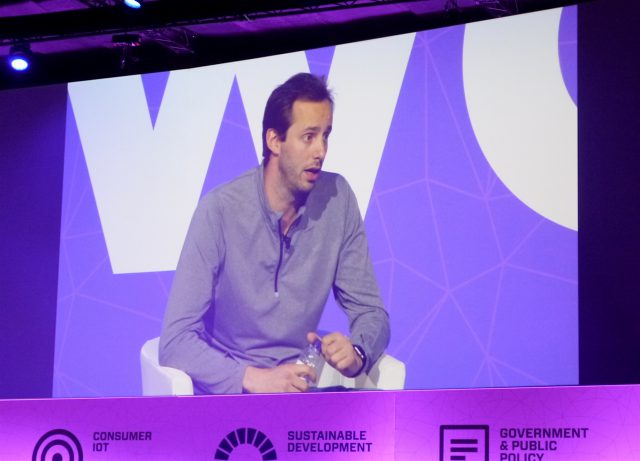Uber-owned Otto’s co-founder Anthony Levandowski must be mightily relieved after an onstage Q&A here at the Mobile World Congress tradeshow passed by with zero awkward moments.
For example, there was no mention of the fact that Levandowski’s former employer is suing his current employer over allegations of IP theft.
Last week Alphabet claimed to have evidence that Levandowski secretly downloaded thousands of engineering blueprints when he was a manager at Waymo’s self-driving car project. And is alleging he used the stolen proprietary IP — such as Lidar circuit board designs — to set up the startup he subsequently sold to Uber last August.
Otto was only founded at the start of 2016 but was publicly demoing its autonomous truck driving system on the highway by May. By August Uber had acquired the startup — for a reported price-tag of $680M.
Yet Levandowski was asked nada about the allegations.
Instead, as he sat on stage clutching a waterbottle, he was asked by Michael O’Hara, the GSMA’s CMO, how Uber could make people feel “comfortable” about using its autonomous technology — rather than being grilled more directly on safety risks and safety record.
After all, under Levandowski’s stewardship, an Uber self-driving car ran a red light in San Francisco last December.
And while, at the time, the company claimed it was due to “human error”, a New York Times report this week suggests otherwise — with the paper quoting two Uber sources saying it was actually being driven in autonomous mode at the time of the incident.
Levandowski was asked generally about security ‘scare stories’ being linked to connected cars. Earlier today, for instance, Softbank’s CEO warned that ARM chips currently being used in cars are not secure from hacking.
And directly before Levandowski’s session, security veteran Eugene Kaspersky painted a Skynet-esque picture of the cyber risks facing hopelessly insecure critical infrastructure and poorly design IoT devices, calling for a wholesale redesigning of all connected systems with security front of mind.
On these general concerns, Levandowski said Uber’s security approach is to build layers into the self-driving system so that, for example, “you’re not exposing your drive-by-wire system to same set of map IDs you want to stream”.
“Absolutely we want to make sure these cars are safe,” he added, to zero follow up.
Also absent from the interview were any hard questions about whether Uber has overriden regulators’ safety concerns in seeking to accelerate its autonomous tech onto public roads as quickly as possible, and before it’s been tested robustly enough — following the typical Uber playbook that puts rollouts and user growth in the driving seat.
In December, for example, Uber was ordered to stop a pilot of its self-driving Uber service in San Francisco — and initially refused, claiming its test vehicles were not truly autonomous and therefore did not require a permit. City regulators disagreed, however, and Uber was forced off the road in California, but clearly not by choice.
Levandowski confirmed it is currently testing self-driving Ubers in Phoenix and Pittsburgh, where it has 12 cars apiece which ride-hailers might be paired with when they call an Uber X.
He was asked a rather softball question about whether councils and cities are “comfortable” with the tech — and about how Uber deals with “regulatory barriers” standing in the way of its self-driving ambitions.
“Regulation is one thing we think is really important,” he duly replied on this. “We want to make sure we are working with the governments to improve safety and make sure innovation can happen quickly so it doesn’t take 10 years to roll out.”
At this point Levandowski went on to disingenuously suggest that self-driving technology should be able to follow a similar timeline to the rollout of mobile phone tech — warning of the risk of “stifling a tremendous amount of innovation”.
Although clearly phones have never been likely to run the risk of running people down in the street and killing them. An obvious point that passed this interview by without being made.
The most sweat-inducing moment for Levandowski was whether he was asked whether the company’s tech has ever hit anything. “We’ve had other people hit us,” he replied, dodging a more direct answer.
“We take very good care operating safely so have vehicle operators in there,” he added. “The responsibility is still on the vehicle operators behind the wheel. We don’t let the car drive on things that are too challenging.”
Uber’s own current troubles with accusations of systemic sexism also — inexorably — went unmentioned during the interview, and the session ended without the opportunity for an audience Q&A. So perhaps Levandowski needn’t have rushed through his answers quite so quickly.
Move along folks, nothing to see here.






























Comment